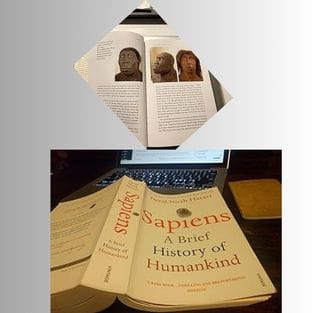Key Takeaways:
- Engaging Narration: The audiobook's narration brings Harari's insights to life, making complex historical concepts accessible and engaging.
- Comprehensive Historical Overview: "Sapiens" provides a thorough exploration of human history, from the emergence of Homo sapiens to the present day.
- Thought-Provoking Insights: Harari's work challenges conventional wisdom and encourages listeners to rethink their understanding of human history.
Introduction to "Sapiens: A Brief History of Humankind"
Yuval Noah Harari's "Sapiens: A Brief History of Humankind" is a captivating journey through the annals of human history.
The audiobook version, narrated by Derek Perkins, adds an extra layer of engagement, making it a must-listen for history enthusiasts and curious minds alike. Harari's ability to distill complex historical events into digestible narratives is nothing short of remarkable.
The audiobook spans the entirety of human existence, from the dawn of Homo sapiens to the modern era. Harari's storytelling prowess, combined with Perkins' compelling narration, ensures that listeners are hooked from the very beginning.
This review will delve into the various aspects of the audiobook, highlighting its strengths and unique features.
The Narration: Bringing History to Life
Derek Perkins' narration of "Sapiens" is a standout feature of the audiobook.
His clear and expressive voice makes the content accessible and engaging, even for those who might not typically gravitate toward historical texts. Perkins' ability to convey emotion and nuance adds depth to Harari's words, making the audiobook a truly immersive experience.
Perkins' narration is not just about reading the text; it's about bringing the story to life ... His pacing is impeccable, ensuring that listeners can follow along without feeling rushed or overwhelmed.
This careful balance between clarity and engagement is what sets the "Sapiens" audiobook apart from other historical works.
The Cognitive Revolution: A Turning Point
One of the most fascinating sections of "Sapiens" is the discussion of the Cognitive Revolution.
Harari argues that this period, which began around 70,000 years ago, was a pivotal moment in human history. It was during this time that Homo sapiens developed the ability to think and communicate in complex ways, setting the stage for the development of culture, art, and technology.
The audiobook delves into the implications of the Cognitive Revolution, exploring how it enabled humans to cooperate in large groups and share knowledge across generations.
Harari's insights into this period are both thought-provoking and enlightening, offering listeners a new perspective on the origins of human society.
The Agricultural Revolution: A Double-Edged Sword
Harari's exploration of the Agricultural Revolution is another highlight of the audiobook ... He describes how the transition from hunter-gatherer societies to agricultural communities fundamentally changed the course of human history.

*While agriculture allowed for the development of cities and civilizations, it also brought about new challenges and inequalities.
The audiobook examines the impact of the Agricultural Revolution on human health, social structures, and the environment.
Harari's balanced approach ensures that listeners understand both the benefits and drawbacks of this transformative period. His analysis encourages listeners to consider how these historical developments continue to shape our world today.
The Unification of Humankind
In "Sapiens," Harari explores the various forces that have contributed to the unification of humankind ...
He discusses the roles of empires, religions, and trade networks in bringing diverse cultures and societies together.
The audiobook provides a comprehensive overview of these unifying forces, highlighting their significance in shaping human history.
Harari's examination of the unification of humankind is both insightful and engaging ... He delves into the complexities of cultural exchange and into the ways that societies have influenced one another.
This section of the audiobook offers listeners a deeper understanding of the interconnectedness of human history.
The Scientific Revolution: A New Era
The Scientific Revolution is another key focus of "Sapiens."
Harari argues that this period, which began in the 16th century, marked a significant shift in human thought and understanding.
The audiobook explores how the Scientific Revolution led to groundbreaking discoveries and innovations that have shaped the modern world.
Harari's analysis of the Scientific Revolution is both thorough and accessible ... He explains complex scientific concepts in a way that is easy to understand, making this section of the audiobook particularly engaging.
Listeners will gain a new appreciation for the impact of scientific advancements on human history.
Capitalism and the Modern Economy
Harari's exploration of capitalism and the modern economy is a thought-provoking aspect of "Sapiens."
He examines the origins of capitalism and its role in shaping contemporary society.
The audiobook delves into the ways in which economic systems have evolved over time, highlighting the impact of capitalism on global development.
The audiobook provides a balanced perspective on capitalism, discussing both its benefits and drawbacks. Harari's insights into the modern economy encourage listeners to think critically about the systems that underpin our society.
This section of the audiobook is particularly relevant for those interested in economics and social change.
The Anthropocene: Humans as a Geological Force
In "Sapiens," Harari introduces the concept of the Anthropocene, a term used to describe the current geological epoch in which human activity has become the dominant influence on the environment.
The audiobook explores the ways in which humans have transformed the planet, from deforestation and pollution to climate change and biodiversity loss.
The Anthropocene
Harari's discussion of the Anthropocene is both sobering and enlightening ... He highlights the urgent need for sustainable practices and the importance of understanding our impact on the environment.
This section of the audiobook encourages listeners to reflect on their own role in shaping the future of the planet.
The Future of Humankind
Harari concludes "Sapiens" with a thought-provoking exploration of the future of humankind.
He discusses the potential implications of emerging technologies, such as artificial intelligence and genetic engineering, on the future of our species.
The audiobook delves into the ethical and philosophical questions raised by these advancements.
Harari's insights into the future of humankind are both optimistic and cautionary ... He encourages listeners to consider the potential benefits and risks of technological progress, urging us to think critically about the direction in which we are headed.
This section of the audiobook is a fitting conclusion to Harari's comprehensive exploration of human history.
Personal Reflections and Anecdotes
Throughout "Sapiens," Harari weaves in personal reflections and anecdotes that add depth and relatability to his analysis. These moments of introspection provide listeners with a glimpse into the author's thought process and motivations.
The audiobook benefits from these personal touches, making the content more engaging and accessible.
Harari's anecdotes often serve to illustrate broader historical concepts, helping listeners to connect with the material on a personal level.
These reflections add a human element to the audiobook, reminding us that history is not just a series of events, but a story of individuals and their experiences.
Summary
"Sapiens: A Brief History of Humankind" is a captivating and thought-provoking audiobook that offers a comprehensive exploration of human history.

Derek Perkins' engaging narration brings Yuval Noah Harari's insights to life, making complex historical concepts accessible and engaging.
From the Cognitive Revolution to the future of humankind, the audiobook covers a wide range of topics, providing listeners with a deeper understanding of our species' journey.
Harari's balanced approach ensures that listeners gain a nuanced perspective on historical events and their implications. The audiobook encourages critical thinking and reflection, making it a valuable resource for anyone interested in history, science, and the future of our species.
FAQ
Q: Is the audiobook version of "Sapiens" different from the print version?
A: No, the audiobook version of "Sapiens" contains the same content as the print version.
However, the narration by Derek Perkins adds an extra layer of engagement, making the material more accessible and enjoyable for listeners.
Q: How long is the "Sapiens" audiobook?
A: The "Sapiens" audiobook has a runtime of approximately 15 hours and 18 minutes.
This length allows for a thorough exploration of the topics covered in the book, providing listeners with a comprehensive understanding of human history.
Q: Is "Sapiens" suitable for listeners who are not familiar with history?
A: Yes, "Sapiens" is suitable for listeners of all backgrounds. Yuval Noah Harari's clear and engaging writing style, combined with Derek Perkins' compelling narration, makes complex historical concepts accessible to a wide audience.
Whether you are a history enthusiast or a curious newcomer, you will find "Sapiens" to be an enlightening and enjoyable listen.
Summing Up
"Sapiens: A Brief History of Humankind" is a captivating and thought-provoking audiobook that offers a comprehensive exploration of human history.
Derek Perkins' engaging narration brings Yuval Noah Harari's insights to life, making complex historical concepts accessible and engaging.
From the Cognitive Revolution to the future of humankind, the audiobook covers a wide range of topics, providing listeners with a deeper understanding of our species' journey.
Harari's balanced approach ensures that listeners gain a nuanced perspective on historical events and their implications.
*The audiobook encourages critical thinking and reflection, making it a valuable resource for anyone interested in history, science, and the future of our species.
Disclaimer. When you purchase through links on our site, we may earn an affiliate commission (that's how we stay in business). FirstFewFinds may use affiliate links to products and services on retailer sites for which we can receive compensation if you click on those links or make purchases through them. We hope you find the list of our first few finds useful and helpful. Each product on our list has been carefully chosen by our writers and all opinions are our own. Check your choices and enjoy finding exactly what you need!








